What is a Baby Box bill?
Update February 28, 2024: See recent development below.
Baby Box bills, many of them making their way to legislatures around the country, seem, at first glance, like slam dunks.
After all, no one would ever argue for a distraught mother having no other option than infanticide. In fact most would argue instead that anything that “saves just one baby” should definitely become part of the civic fabric.
Certainly, many of those offering testimony in a Colorado senate hearing yesterday used the “just one baby” reasoning.
But I didn’t. Like others testifying against the bill, I was thinking of the other babies, the ones who eventually become adults disconnected from their origins and their origin story. I was thinking of those who experience separation on top of separation, and of the distraught mothers themselves.
Baby boxes originated as “foundling wheels” in Italy in 1198. They gave distraught mothers an alternative to dropping their babies in the Tiber River. All she’d need to do is find a foundling wheel located somewhere around town, put her baby in it, and turn the wheel –which rings a bell and alerts someone inside that there has been a baby dropped off.
Eight centuries later, every state has safe haven laws (which are not the same as Safe Haven Baby Boxes, the name of a private organization), which allow a distraught mother to hand her baby to someone — a caring person –at a hospital or fire station. If the baby is unharmed, no charges will be filed for abandonment. The mother is not required to give her name or identifying information. She can, however, make sure of a warm handoff for her infant.
Why Would Anyone Be Against Baby Boxes?
My friend Rich Uhrlaub, Founder and President of the Coalition for Truth and Transparency in Adoption, shares a few reasons why baby boxes require a closer look. Once you start seeing things, you can’t unsee them (which was evidently experienced by a few senators in the hearing).
- Baby boxes rob a mother in crisis (or danger) of the opportunity for needed support. With a baby box, anyone could drop off a baby — an abuser, a pimp, a manipulative or nefarious person. With current safe haven laws, at least there is human contact.
- But baby boxes eliminate the opportunity for a trained employee to visually assess the person delivering the infant to a safe haven and offer the chance to voluntarily offer social/medical history, reasons for abandonment, or ask for help.
- Baby boxes assume and perpetuate shame. And they do NOT make the process more anonymous (think cameras watching the boxes). No name doesn’t mean no shame.
There are other reasons not to back baby box bills, including…
- Financial reasons. If distraught mothers don’t already know about safe haven laws (which people in safe haven organizations lament is the case), why would we think they’ll know about baby box laws? Wouldn’t the $16,000 per box (plus maintenance) be better spent on awareness of existing safe haven laws and drop-off points?
- Safety/risk reasons. Infants are supposed to be in the temperature-controlled boxes for only a few minutes. But what if something goes wrong with the alarm system? Or with the electrical system? Or the temperature regulation system? What if someone else takes the baby during the time they are in the box?
But I didn’t address any of that in my testimony. I spoke from an adoptive parent perspective, based on what baby boxes cost adoptees and, therefore, their adoptive parents.
My Testimony
While crafting my testimony, I consulted with several adoptee-activists so as to ally with their efforts most effectively.
This is what I came up with for my allotted 3 minutes before the hearing for the Senate Committee on Health & Human Services. My son, a 21 year old adoptee, approved my message and helped me practice delivering it in the days preceding. He’s a poli sci major, so it was also fun to talk with him about the democratic and legislative processes themselves.
 My name is Lori Holden, and I’m an adoptive mom of two young adults via infant adoption. I am also the author of two critically acclaimed books about adoption, and since 2020 have hosted a podcast for adoptive parents. In 2018 I was nominated by Senator Michael Bennet as an Angel in Adoption®, awarded by the Congressional Coalition on Adoption Institute.
My name is Lori Holden, and I’m an adoptive mom of two young adults via infant adoption. I am also the author of two critically acclaimed books about adoption, and since 2020 have hosted a podcast for adoptive parents. In 2018 I was nominated by Senator Michael Bennet as an Angel in Adoption®, awarded by the Congressional Coalition on Adoption Institute.
Over the past 20 years I have learned – often the hard way – that many common assumptions that underlie adoption policy are simply not true. Such as these, relevant to SB-83:
- Babies are not blank slates. Instead, neuroscience tells us that an infant’s brain is encoding and storing every single experience, especially ones of extreme disconnection.
- Biology matters. Not knowing a baby’s genetic information hamstrings parents – and later, the adoptee who may not even know the basics around their identity. Even more urgent, not knowing any information about the baby’s in utero experience (for example, exposure to alcohol or other substances) keeps adoptive parents from recognizing the need for and accessing early interventions. In either case, there are lifelong impacts for parent and child.
- I did not “rescue” my children. Instead, there were up to 50 other people wishing to adopt each of them. My children would not have languished without me. I, however, may have languished without them, but adoption is supposed to be more about the needs of the child and less about the desires of the adoptive parents.
- Relinquishment and adoption are not one-moment-in time events. Instead, they are lifelong processes that adoptees, birth parents, and, yes, adoptive parents will forever be journeying, often without support because everyone thinks adoption is “win/win.”
Madame Chair and members of this committee, it’s easy to be shortsighted when presented with a perceived crisis like this. Instead, good policy requires careful thought about the best way to support adopted persons and mothers-in-crisis in “the long view,” which happens to be the name of my podcast.
If we truly understood baby’s brains and what makes for secure attachment we would not encourage anonymous and impersonal Baby Boxes. We would encourage MORE connection for a vulnerable mother and her infant, not less. Baby boxes make this lifelong process of forming connection to self and others even more difficult by the disconnections inherent in such an impersonal dropoff.
Current Safe Haven laws offer widespread, abundant locations at which a baby can be left anonymously. Removing the seemingly small – but very important — requirement for human-to-human transfer of an infant would multiply challenges and difficulties for future adoptees and their parents. I respectfully ask for your NO vote on SB-83, and welcome any questions.
What was the result of the committee vote?
Of the nine committee members, I wouldn’t be surprised if, prior to the hearing, most of them planned to vote in favor. Because who would ever argue for the dichotomy of infanticide? Who wouldn’t want to “save just one baby?” At first glance, this seems like a black and white, open and shut issue.
But nothing about distraught mothers, their babies, and adoption is that simple. There are so many shades in between that affect the babies who are “saved,” not in small ways, and always with lifelong impacts.
The end vote was 5-4 in favor of baby boxes. Some senators reported they’d changed their minds to No. This means the testimony against baby boxes reached senators who hadn’t already made up their minds.
The bill is up for a second reading tomorrow.
Exciting Update!
Against the odds, SB-83 died on the Senate floor on its third reading on February 27, 2024. Cheers to all those who testified and shared their thoughts with senators. And cheers to the senators who listened.
In Conclusion
Whether in front of cameras or in front of committee hearings, sponsors of these bills and the baby box organization itself tout each baby drop-off as a success. Another baby was left in a box in Smallville last night — hooray! ([The founder’s] mission requires staying in the press.)
Why would we be excited about babies left in boxes? Why is that counted as a success for the baby and not a failure for the mother? Are baby box bills really the best we can come up with 826 years after foundling wheels?
And when “it’s hard to imagine a bigger trauma than loss-of-mother at the beginning of life” (Paul Sunderland) — why would we come up with solutions that require more separation rather than less?
We can and must do better than baby boxes for distraught mothers and their vulnerable babies. Keep an eye on your own state legislatures and raise your voice for vulnerable mothers and babies.
If we truly understood baby’s brains and what makes for secure attachment we would not encourage anonymous and impersonal baby boxes. We would encourage MORE connection for a vulnerable mother and her infant, not less.
More information on Baby Boxes
- For an adoptee-centered perspective, check out Stop Baby Boxes Now.
- Adoption Unfiltered interview with Dr Patrice Martin, a “foundling” herself who argues passionately against baby boxes in various state legislatures.
- Our interview with Greg Luce of Adoptees United, in which we talked about baby boxes, among other issues.
- “More places install drop-off boxes for surrendered babies. Critics say they’re a gimmick“—on Stateline.
- As far back as 2012: U.N. Committee Calls for an end to Centuries-Old Practice of “Baby Boxes”
Lori Holden, mom of a young adult daughter and a young adult son, writes from Denver. She was honored as an Angel in Adoption® by the Congressional Coalition on Adoption Institute.
- Her new book, Adoption Unfiltered, was co-authored with adoptee Sara Easterly and birth parent Kelsey Vander Vliet Ranyard. It’s already being hailed as a “must-read” for people involved in adoption and those who love them.
- Her first book, The Open-Hearted Way to Open Adoption, makes a thoughtful anytime gift for the adoptive families in your life.
- Lori also co-authored, Standing Room Only: How to Be THAT Yoga Teacher with her sister, Sheri Fisher.
Find Lori’s books on her Amazon Author page, and catch episodes of Adoption: The Long View wherever you get your podcasts.


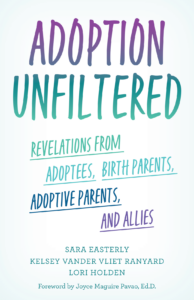
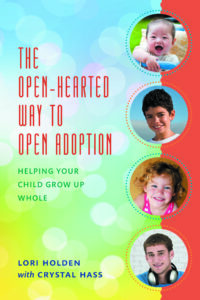

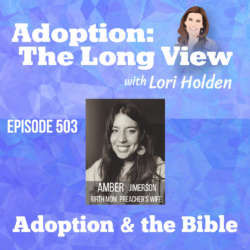
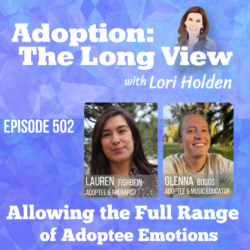
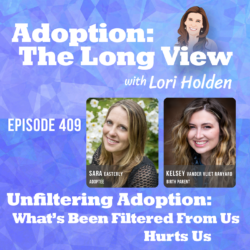
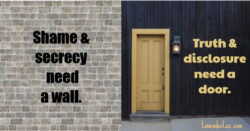
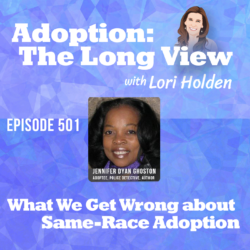

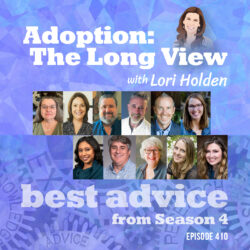
6 Responses
Thanks Lori! Adoptive parent voices like yours are so important in this effort to educate legislators and urge them to think more carefully about this issue.
Wow, I did not know about this legislation before reading. I wouldn’t have thought of someone else dropping the baby in the box, how awful that possibility is, or how clearly it robs a vulnerable woman of human contact and possible services. The lack of services for women in crisis and continuation of shaming are just astounding. I also didn’t know about foundling wheels… How is it that not much has changed in this regard in 826 years??? Thank you for bringing attention to this issue.
As a 62 year old survivor of infant-mother separation, I share your opinion that all efforts to prevent baby boxes is to be commended. What may seem on surface level to be an altruistic effort to save a baby, can have long-lasting, damaging effects on mother and baby. Offering more connection and support is a much healthier approach. Thank you for your advocacy, Lori!
Exactly, Linda. Over and over again I hear adoptees say the same things. More connection and more support.
I see your point, and agree with you in theory. But, man…our society does not make it easy for women to do anything. So I also see how these anonymous boxes could be the answer for some women. There is no straightforward answer available to us until, as a society, we recognize that preconceptions about women and their roles in society need to be totally revised. No real support for mothers will ever be provided until we stop trying to punish them for allowing themselves to get pregnant in the first place.
But your speech was excellent!
This is a great point, A. There is going upstream with helping vulnerable mothers, and then there is UPSTREAM by ceasing to limit their roles in society and the choices they make around them.